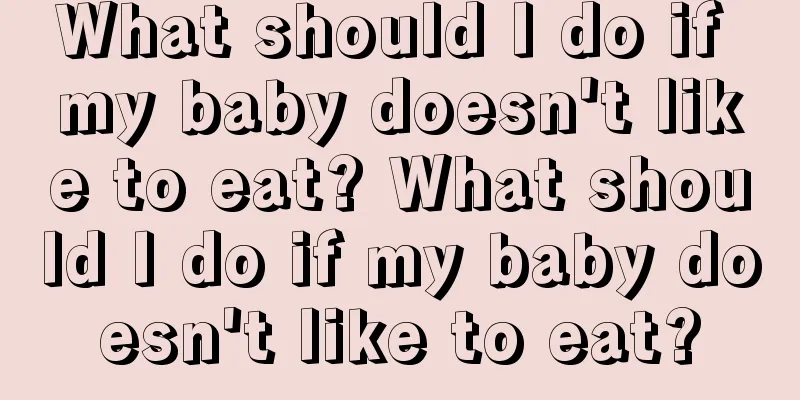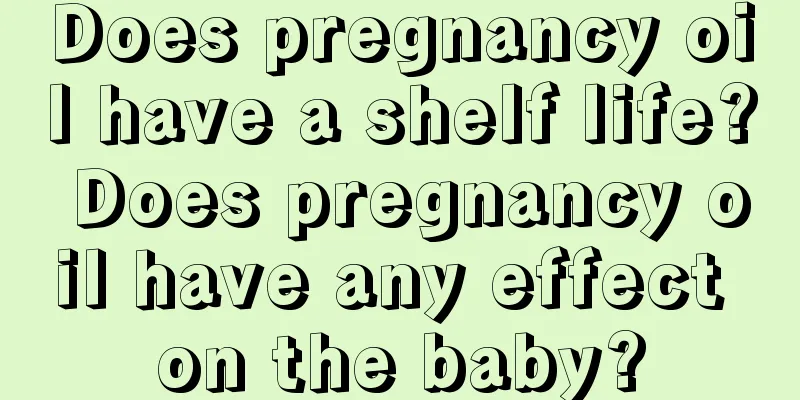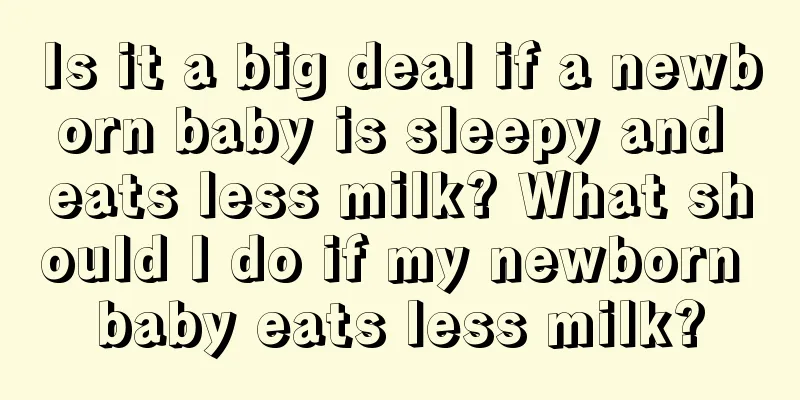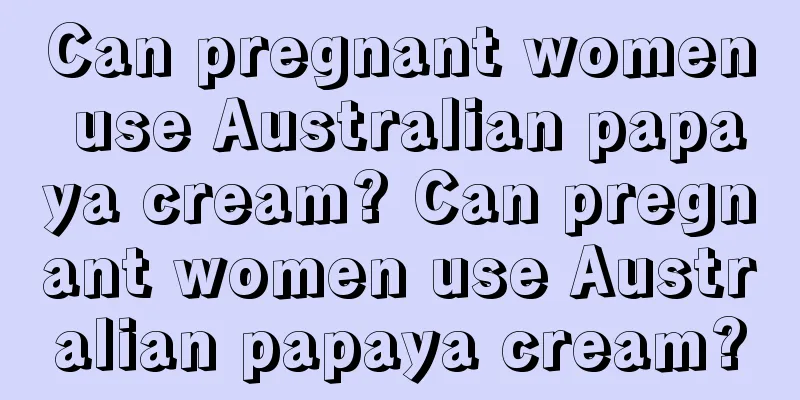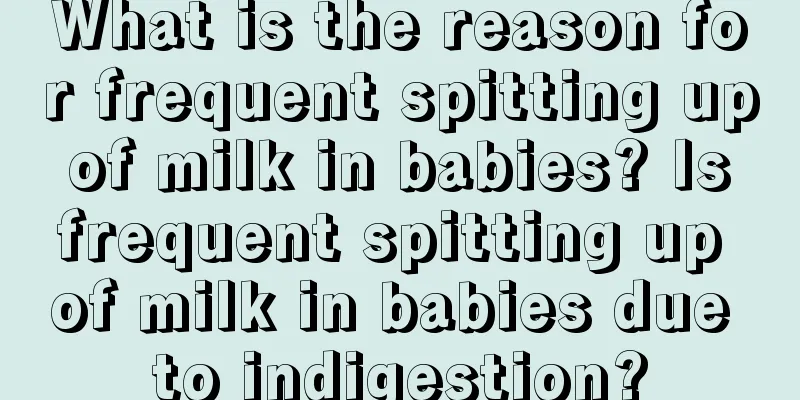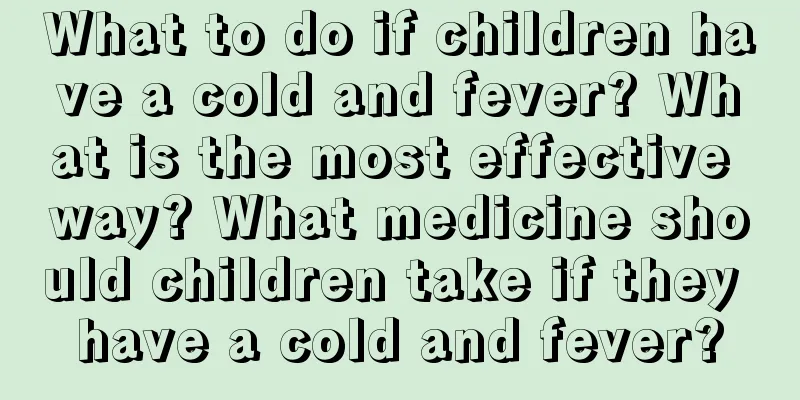Can babies take a bath after vaccination? Mothers should pay attention
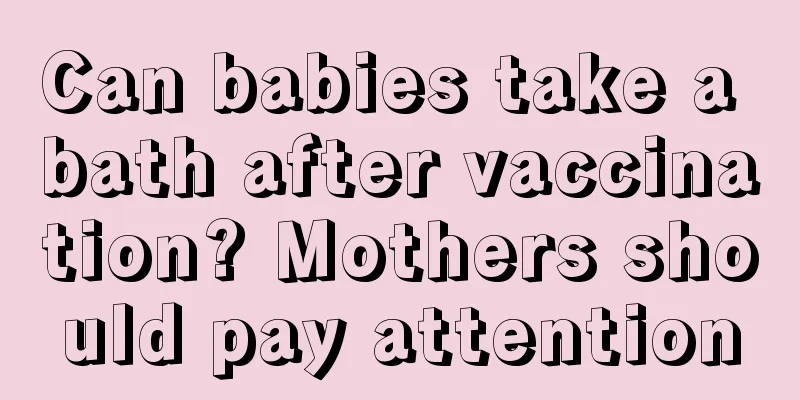
|
Babies need to receive various vaccines from birth, and there are different vaccines for each age stage. So what should you pay attention to when your baby gets vaccinated? How long should you wait before you can take a bath after the vaccination? What other precautions are there? Mothers must make this clear. Can I take a bath after my baby has received vaccinations?Generally speaking, you can bathe your child normally 2 to 3 days after vaccination, but be sure to avoid catching a cold, because after vaccination, the child's immune function will be weakened and the probability of respiratory infection is relatively high. After vaccination, if there is no fever, diarrhea, or vaccine reaction, you can bathe your child normally three days later, but be sure to keep warm and avoid catching a cold. If there is a fever caused by vaccine reaction, do not bathe your child for the time being. After the baby is vaccinated, there will be a temporary decrease in resistance. After taking a bath, you should keep warm to avoid catching a cold. Many vaccines are live bacteria, and the injection is relatively superficial. Taking a bath may affect the effect. Secondly, there is a small needle hole at the injection site. Taking a bath may cause infection. Of course, these chances are very small. You can observe it. If there is no abnormality, you don’t need to worry too much. But if you are still worried, it is best not to take a bath within three days. The reason why you can't take a bath after getting a vaccination1. Because the vaccine itself is a virus or a pathogenic part of a virus. Although it is inactivated, the human body will still have an immune response. Taking a bath at this time is easy to catch a cold and reduce immunity, thus causing infection. 2. Why aren’t babies allowed to take a bath after vaccination on the same day? The reason is actually very obvious – fear of infection! Fear of infection at the injection site, fear of breaking the wound which is not conducive to recovery, fear of unclean water causing inflammation of the wound. 3. They are afraid that the baby will catch a cold after taking a bath, which will lead to immune failure. 4. The most important thing is that the vaccine will take effect after a week. In other words, the baby's body resistance will decrease within a week after the vaccine injection. Of course, it is okay to take a bath after 24 hours. When you take your baby to get a vaccination, the nurse will tell you not to bathe the baby on the same day. Many mothers cannot understand this. For adults, it is okay to bathe after a vaccination, so why can't babies? After reading this article, I believe you will find the answer. Some babies still cry after getting a vaccination, so mothers need to take good care of them. Situations where babies should not be vaccinated1. Babies with a history of allergies should not be vaccinated (except for trivalent polio vaccine). 2. Babies with severe heart, liver, kidney diseases and tuberculosis should not be vaccinated. 3. Babies with congenital immune deficiencies or low immune function should not be vaccinated, especially live vaccines. 4. Babies with central nervous system diseases, such as: cerebral dysplasia, epilepsy, high fever convulsions, history of convulsions, sequelae of encephalitis, etc., are not suitable for vaccination, especially DTP mixed preparations, Japanese encephalitis and meningococcal vaccines. 5. If your baby is in the acute stage of an illness or has an acute infectious disease, vaccination should be postponed to avoid aggravating the condition. The editor recommends that vaccination be given one week after full recovery. 6. If the baby has a fever and the body temperature exceeds 37.5℃, vaccination should be postponed. 7. If the baby has severe dermatitis, psoriasis, eczema, rash and purulent skin disease at the vaccination site, vaccination should be carried out after recovery. 8. If the baby's bowel movements are more frequent than usual, such as more than 4 bowel movements a day, or if he has diarrhea, he should not take the polio vaccine. 9. Babies who are found to be allergic to eggs should not be vaccinated with measles, leprosy, mumps/rubella, influenza and other vaccines. 10. Babies who are allergic to milk protein or have congenital immune deficiency should not take oral attenuated live polio vaccine. What to do if you have a feverIf fever occurs, appropriate treatment can be carried out according to different body temperature conditions. If the body temperature is ≤37.5℃ after the injection, drink more water and rest more, use physical cooling, and wipe with a warm towel. It is not recommended to wipe with alcohol, as parents generally do not have a good grasp of the degree of dilution. If the body temperature exceeds 37.5℃, in addition to physical cooling, antipyretics need to be used under the guidance of a doctor. This will not affect the effectiveness of vaccination. If the high fever persists, it is recommended to take the child to the hospital. |
>>: What can I eat after a cesarean section? What can I not eat after a cesarean section?
Recommend
What if I have big breasts but little milk? What should I do if I have big breasts but no milk?
Many parents believe that the size of the breasts...
What should I do if my child's earwax becomes hard? Is it harmful if my child's earwax becomes hard?
What should we do when children's earwax beco...
How long does it take to get a medical abortion? What are the side effects of medical abortion?
Many girls will have unexpected pregnancies, and ...
How can parents strengthen parent-child bonding during holidays?
In the process of growing up, sufficient interact...
What to do if your child has diarrhea? What food is good to eat?
In addition to colds, diarrhea is also a common d...
How long does it take for menstruation to come after an abortion? What should I eat to nourish my body?
Some women do not have their periods for a long t...
Can pregnant women use a warm pack? Will it affect the baby's health?
Pregnant women have many taboos in life, so, can ...
How can we reduce the incidence of baby spitting up? What should we pay attention to after the baby spit up?
The baby's stomach is very fragile. Once ther...
How long after the baby's fever subsides can he be vaccinated? Why does the baby keep crying after the fever subsides?
Compared with the careful care of the baby during...
What is the best food to eat when preparing for pregnancy? What foods are good for pregnancy?
Proper diet during pregnancy preparation can grea...
What are the symptoms of anemia in children? What can children with anemia eat to replenish blood the fastest?
It is normal for children to have anemia symptoms...
How to distinguish lochia from menstruation? Do lochia and menstruation smell the same?
Lochia is the fluid that a woman will discharge a...
What complementary food should a 6-month-old baby eat? Analysis of daily complementary food additions for a 6-month-old baby
Daily recipe calendar for baby food supplement. T...
How to bathe your baby correctly if his skin is prone to allergies
The thickness of baby's skin is only 1/2 to 1...
Can eating eggs improve intelligence?
Eggs are rich in nutrients and are very suitable ...
